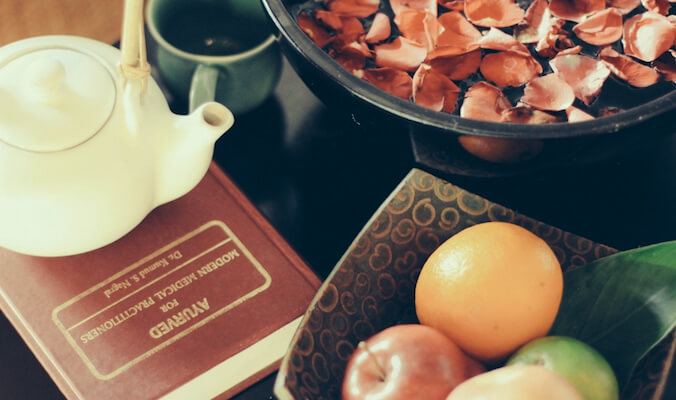The Pillars of Healthy Eating

© Sukhavati Ayurvedic Retreat & Spa, Bali
Of course it is important to meet the body’s daily requirements of proteins, carbohydrates, fats, vitamins and minerals. However, a different approach to the pillars of healthy eating focuses on the composition of the food according to the five elements: taste, quality, preparation, consumption and digestion.
Avoid toxic build-up in the body.
Eating according to these principles and with a certain attentiveness will ensure proper metabolism and nourishment.
Food is our life force (prana), and therefore it can either act as medicine or poison. Thus, conscious eating should nourish the three bodily intelligences (Vata, Pitta, Kapha), the seven tissues and elimination systems, and provide us with vital energy needed for physical and mental functions.
Tips for a more balanced and nutritive diet
Taste
For a balanced diet you want to combine all six tastes in every meal: sweet, sour, salty, bitter, pungent and astringent. If this is not possible due to time constrains, you might want to try and incorporate all tastes throughout the day as a starting point.
Alternatively, you might want to add churna to your food. This is a mixture of powdered herbs and minerals that contains all 6 tastes.
Agni (Digestive Capacity)
Without a healthy digestion the body cannot process food properly. Heavy, cold, dense and uncooked foods further a weak digestion, so you might want to avoid or minimize these.
People with a strong digestion and a tendency towards reflux or heartburn, should avoid overeating and consuming hot, acidic, pungent, fried and fermented foods.
How to Eat Healthy
- Do not eat standing or walking, always sit down.
- Eat in a peaceful clean area.
- Eat slowly and chew thoroughly to aid in digestion.
- Avoid fast food.
- Don’t eat when you are angry, depressed or immediately after exercise as your digestive system is not ready to work properly yet.
Quality & Quantity of Food
Eat fresh, wholesome and cooked foods as often as possible.
Purchasing and cooking your own food gives you quality control.
Although the quantity of food one should consume is largely subjective, there is the general rule to fill the stomach to ½ full with any solid food, ¼ with liquids, and leave ¼ of stomach empty to allow the nutrients to mix with the digestive juices.
Preparation
Always check how to prepare food properly. Honey for example should never be heated up, as it transforms into glue in the digestive system, which produces toxins.
Avoid overcooked, undercooked, unpleasant tasting, unripe, over ripe, putrefied, stale and fried food, as they all aggravate the doshas.
Eating habits have a direct affect on the digestive capability (e.g. if you always eat cooked food, consuming raw food might be tough for your digestion).
Incompatible Food Combinations
Combining foods improperly can produce indigestion, fermentation, petrification and gas formation. Here are some basic concepts of food combinations:
- Avoid taking milk & yoghurt with sour fruits
- Avoid eating melons and grains together
- Honey should never be cooked
- Avoid eating fruits with potatoes or other starchy foods
- Don’t eat meat protein and milk protein together. They counteract one another, as meat is heating and milk is cooling.
- Milk and melon should not be eaten together
- Milk and bananas should not be eaten together. It can diminish agni, produce toxins and cause sinus congestions, colds, coughs and allergies
- Milk is also incompatible with: fish, curd, meat, melons, sour fruits, kitchari, cherries and bread containing yeast
- Starch is incompatible with: eggs, chai, milk, bananas, dates and persimmons
- Honey is incompatible with: ghee (in equal proportions), heating/cooking
- Radishes are incompatible with: milk, bananas, raisins
- Yoghurt is incompatible with: milk, sour fruits, melons, hot drinks, meat, fish, mangoes, starch, cheese
- Eggs are incompatible with: milk, meat, yoghurt, melons, cheese, fish, bananas
- Mangoes are incompatible with: yoghurt, cheese, cucumber
- Lemon is incompatible with yoghurt, milk, cucumber and tomatoes
Diet & Lifestyle Planning
Make your life more easy and enjoyable.
If you are looking to change your lifestyle and consequently your diet, it is strongly suggested to consult with an Ayurvedic practitioner first in order to get a deeper understanding of your constitution and your current state of health.
Ensure you are following the correct measures to bring you towards a state of balance and equilibrium. Be conscious about of your state of health and aim for balance. This way you will feel light and energized, ready to tackle life.
Find out more about Sukhavati Ayurvedic Retreat & Spa, a member of Healing Hotels of the World.



Comments 2
Jade
Aug 18, 2017Our systems are dependant on the food we consume so eating well should be a top priority for us. Foods rich in vitamins and minerals are critical for proper functioning and without these, your body and mind will start to deteriorate much faster. Knowing what to consume is based on so many individual factors and I can help figure those factors out. I am a nutritional therapist in Cape Town, love your thoughts, http://hannahkaye.co.za/.
taolay
Apr 27, 2017___123___The Pillars of Healthy Eating | JustBreathe___123___